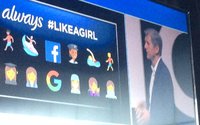Commentary
How P&G Is Trying To Escape The 'Content Crap Trap'
- by Larissa Faw , Staff Writer, June 23, 2016

Every day people are bombarded by thousands of ads developed by thousands of agencies. Procter & Gamble's solution to cut through this clutter was to create new ads, quipped Marc Pritchard, chief brand officer, P&G during a Cannes Lions event on Thursday.
“Maybe if our ads can't get enough love or attention, we can get louder or more complex,” he says. “We were adding to the noise."
There was the four-and-half minute Pepto-Bismol viral video that didn't mention the brand until minute 4:29. A Cinco de Mayo recipe promoted haircare brand Pantene, feminine care brand Always is somehow connected to squirrels and "a devil baby" supports Oral-B, he says. These ads made P&G realize that it had fallen into the "content crap trap."
In response P&G reevaluated its strategy. "We are stepping up our game to give consumers experiences they deserve," says Pritchard. P&G is embracing creativity as the unique endeavor it is, he says.
P&G isn't doing this alone. He says any negative chatter about agency-client relationships needs to stop. "They are our partners. All of us are in the community made up of good people who want to do good work and create magic together."
P&G is elevating the craft of its campaigns across its portfolio of brands by conveying emotional moments. This skill requires technique, imagination, craftsmanship, and verbal poetry, he says. The results are already proving successful. Pantene's Super Bowl ad was touted for its authentic humanity after showing NFL athletes braiding their daughters' hair.
Now, instead of merely promoting clean clothes, Tide commiserates with those facing the cleanliness challenges of “Sandwich Generation” families. Ariel took on generational bias with the "Is laundry only a mother's job" campaign. The result has made Ariel the fastest-growing laundry detergent brand in India, per Pritchard.
Upscale skincare brand SK-II called out China's dismissal of so-called “sheng nu,” or “leftover” unmarried women. After P&G learned that 94% of boys now get shaving advice from the Internet instead of from their dads, the shaving brand introduced ads connecting to this shift.
Most recently Always launched an awareness campaign over how emoji's skew male. The ads show girls wondering why there aren't any female doctor, lawyer, or cop images. One girl mistakenly believed one emoji was a girl surfer until realizing it was a guy with long hair. This #LikeAGirl project received thousands of submissions and this week, Facebook and Google are introducing several new emoji images with women thanks to this campaign.
P&G's new strategy is tied to the root of the word advertising, which means to turn toward. "Everything we are doing is to get people turned to our brands and to buy our brands," says Pritchard.














